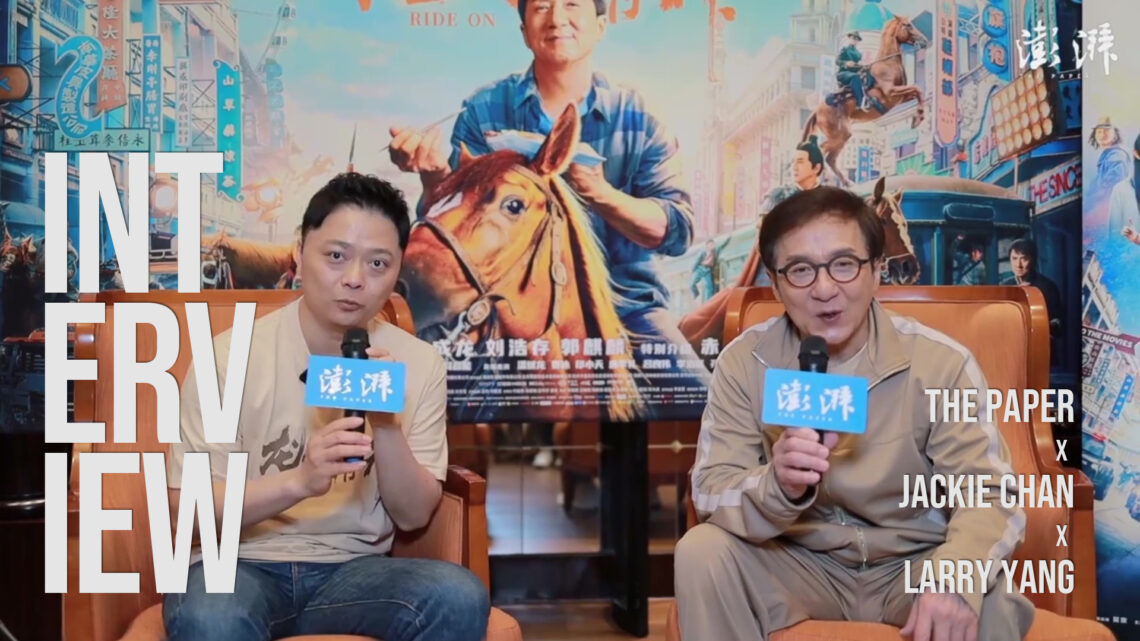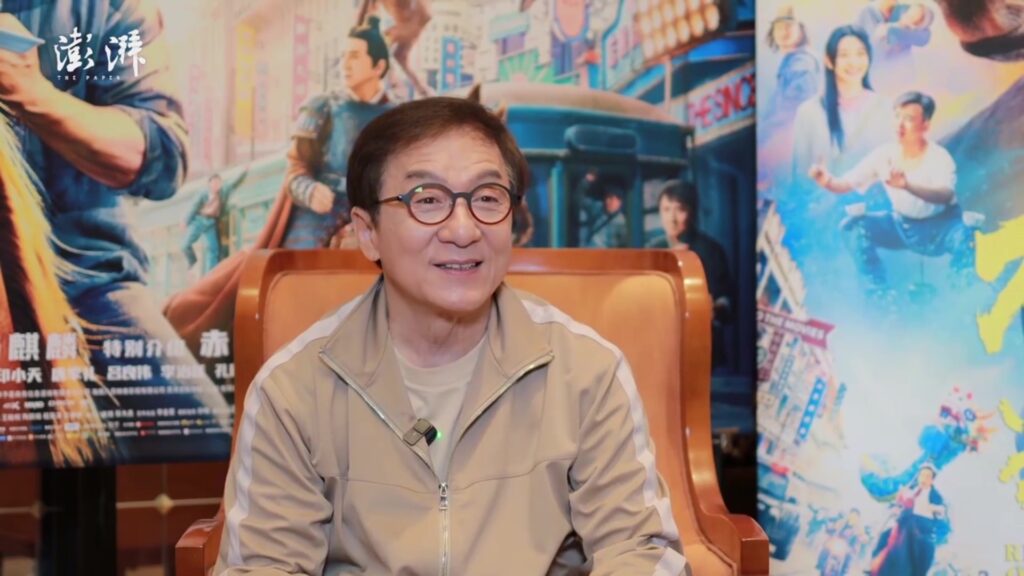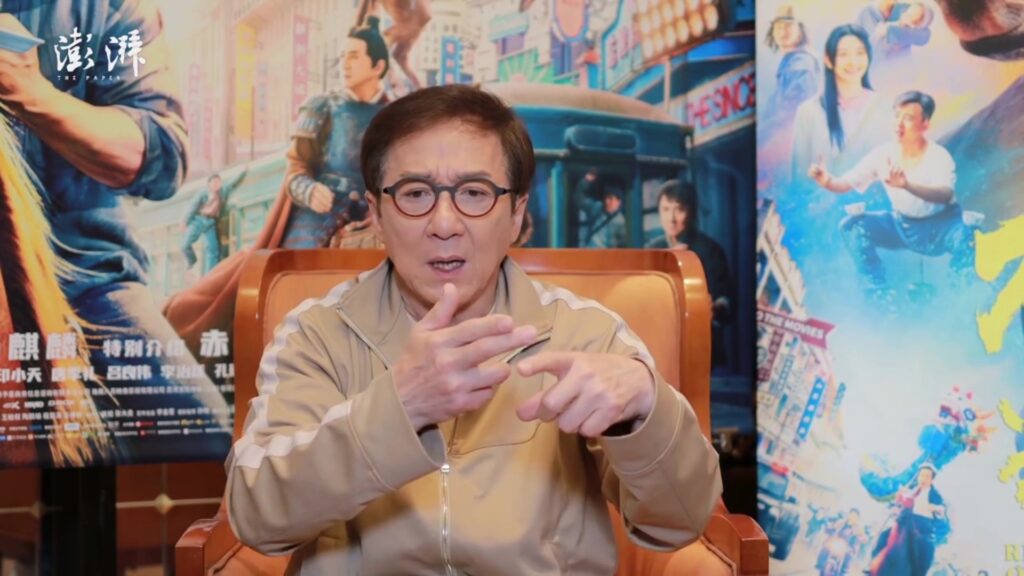
Jackie Chan in interview: “As long as they tell me to make films, I will risk my life”.
The promotional drum for Jackie Chan’s new film “Ride On”, which was released in Chinese cinemas on 7 April 2023, has been in full swing for weeks and months. On the film’s release day, a video interview with director Larry Yang, Jackie Chan and the Chinese online news site The Paper was published.
Jackie Chan France took the trouble to translate the Chinese interview into French. The translation by the chief editor can be read here. With the OK of “Tirry”, I was now able to translate the interview into English.
So that fans can also see Jackie Chan, I have uploaded the almost 8-minute video to my YouTube channel. Please also note the video description there. And now enjoy “Interview with Jackie Chan: I’m willing to put my life on the line as long as they tell me to start filming” (专访成龙:只要喊了开拍,我就可以把命豁出去).
Interview: Jackie Chan x Larry Yang (The Paper, 2023)
This time you started shooting directly with an injury. Is it a new injury or an older one?
It’s an old injury. A year ago I had a blockage in my back, after that I had to walk slowly, couldn’t stand for too long and couldn’t even go to the toilet for too long. I had crutches when the director came to see me; shooting started shortly after. I was afraid that when filming started I would still be on crutches and not be as resilient, which would have put a lot of pressure on him. So I went to the hospital and had a series of injections. That was the last time. I wouldn’t do it like that in the future. I don’t worry when I’m filming. I am a person who can risk his life as long as the camera is on.
What content of the script convinced you?
Besides the references to my life, the script is also a tribute to stuntmen/martial artists all over the world. There are many true stories that used to happen to me. Even though I didn’t personally experience some of them, I saw them with my own eyes, was involved in them and they are still vivid in my memory. Besides, the story is also about the relationship between a father and his daughter and horses. The story is not monotonous at all. It doesn’t just focus on my character. It is very comprehensive and a very good story.
How much Jackie Chan is in your character?
Most of the time I hardly have to act, just like in the previous films. Of course, the director kept telling me how to act in relation to his vision of the character. What I had to consciously avoid was playing as if I were the “big brother”, i.e. the boss, the head of the family. Lao Luo is not a “big brother”, he is an old-fashioned martial artist/stuntman. I want to show this old-fashioned spirit, as well as a lonely and sensitive side. That was not common in my earlier films.
“There’s a saying in our film industry that goes,
that children and animals are the most difficult things to film with.”
Did you feel like you were reliving your old life?
Yes, very often. Old fashioned stuntmen/martial artists live from day to day, we are very happy when we are together and feel very lonely when we are alone. Before the stuntman and martial arts acting profession became popular, you were very isolated. Unlike today, some of us didn’t have phones. It was not so easy to make a phone call in the past. It was only after we started work that everyone could practice trampoline, high jump, long jump and boxing together. After the work was done, everyone went out to eat and drink together. Back then there were not so many entertainment activities, but the groups were very close and many memories were shared. Today it is different. Now there is the supervision of a martial arts instructor, health care, insurance paid for by the production, the smartphone … In the past, the stuntmen/martial artists just jumped off and didn’t worry about what they would wear to break the fall. Yuen Biao and I would bandage our ankles with torn shirts when our feet were sprained. Sometimes I would put on a cast at the hospital and run off to drink with everyone right after. That was the old-fashioned life of Chinese stuntmen.

We grew up with your films and have heard countless legends about you and your kind “never dying”. Do you think about the worst that can happen?
Yes. But when the camera is on, you don’t think about anything. During a stunt, my heart starts racing, so I shout “Action!” to stop thinking. When I did the jump in the finale of “Police Story”, I couldn’t see anything from the seventh floor, I was just relying on a light, my hands were cramped, and I just shouted “Action!” and slid down. If a person stays up there too long, they don’t dare jump. Why couldn’t I jump in “Project A” for seven days? Because I was holding on by looking at the ground. I thought about my starting position. If I moved too far forward, I would break my foot again. I paid attention to the light. If it was cloudy, I put it off until the next day. In the end, Sammo Hung told me to hurry up with the shoot. I went upstairs and asked Sammo Hung to take care of getting the scene going. Because I was already the “big brother” at that point and only Sammo Hung was my “big brother”. As soon as the camera started, I stopped thinking. So later I used this method for other films, and it was the same with my brothers. I told them not to go to the location all day and that they had to film immediately, otherwise you think too much.
“Ride On” is quite special because of the collaboration with a horse. Is it challenging or special to film with animals?
It is very difficult. There is a saying in our film industry that children and animals are the most difficult thing to film with. Yes. It’s very difficult to shoot a scene with an animal. It runs when it wants to and stops when it wants to. Suddenly there is a noise and it gets scared. After the director chose the horse, he asked a horse trainer to train it all the time. I also talked to him every day on the set. You stay patient, loving and take your time while filming. We have filmed horses for so many years, we have also gained experience in filming them.
“The audience won’t let me get older,
they’re even more afraid than I am that I’m getting older.”
Lao Luo in the film is a stuntman/martial artist who faces some discomfort in the new film and television environment. You come from that era yourself. Have you ever had a similar experience in real life?
Very many, in fact, too many. For example, I did a non-profit commercial with Arnold Schwarzenegger in the US where all we had to do was sit on a motorbike. Then when the commercial was released, we were both suddenly on a road in the clip while dodging cars left and right. The effect mimicked an authentic situation. That’s what I don’t understand. I don’t even know how to edit photos, and I don’t personally use WeChat or Weibo. I can only take real photos the old-fashioned way. In real life, I’m like “Lao Luo”. I am “authentic.”
Do you think it was the Chinese stuntmen/martial arts actors who created those brilliant action films of the time (note by the translator: the HK films of the 80s and 90s), or was it because of the underdeveloped technology that the stuntmen/martial artists created that feature?
Both were the case. I also thought about using technology to help us, but we don’t understand it, so we can only continue on this path. After we went down this path, the audience just wanted to see Jackie Chan for real. Now that we have the means and the equipment, we don’t dare to use them. The audience accepts that other actors use doubles to perform their actions, but they don’t accept it from me, from Wu Jing, from Sammo Hung or from Yuen Biao. When they come to see Jackie Chan, they really want to see me fall and jump. They can watch anyone transform into this or that hero or superhero, use special effects to jump from the sky to the ground, no matter how powerful they are, but a Jackie Chan can’t do that.
Do you think that being an “action star” is actually a limitation for you?
Yes, that’s why I have to change. Haven’t I changed in the last ten years? Those who were there before me, those who were there at the same time as me, and those who came after me – how many real action stars are there left? I realised early on that I couldn’t just be an action star, I wanted to be an actor, so I changed. I did “Little Big Soldier”, “The Karate Kid” and “The Foreigner” to prove to international audiences that I was an actor after all. The life span of action actors is very short. At my age, I am no longer an action actor. But it is thanks to the films I did before that the director wrote such a script for me. I don’t have to be a big hero, I can also play a simple stuntman/martial artist. No one has written such a script for me before, certainly not in the US. When people think of me, it’s for “Rush Hour”, a Hong Kong policeman … I can’t be a policeman forever.

Is this transformation due to the fact that you are also slowly becoming aware that you are perhaps old?
Of course I am aware that I am old. But the audience doesn’t let me get older, they are even more afraid than I am that I am getting older. But I can’t pretend that nothing has changed and fool the audience. I still do a lot of movements, but I used to be able to jump directly, without pulleys, but now I can’t do that. What I can do, I will always do myself, because I still like to do it.
When people talk about you, they think you represent the image of the Chinese people in the world. Do you feel any pressure or motivation from that?
It’s a lot of pressure, it bothers me a little. If you look at my films from decades ago, I have always made patriotic films that represent the Chinese. That’s deeply ingrained in me. In the days when Hong Kong had not yet returned to China, they said I was not quite Chinese. They said I was British, but I wasn’t. I just grew up in Hong Kong. All my scripts from that time, reflect patriotic sentiments, and that will never change. Forty years ago, when Western people looked at me, they said I was Japanese. I answered them, “No, I am Chinese”. Sometimes I wear a Tang suit so people know I am Chinese. I also want foreigners to understand our Chinese way of life and culture. When foreigners come, I am the first to invite them for a baijiu. If they don’t like it, I tell them how delicious it is. I just want to promote all these things.
There is a saying that the golden age of Hong Kong films was created by different film companies and their teams.
Yes. We liked to challenge each other. I fight with Sammo Hung, Sammo Hung fights with Yuen Woo-Ping, Yuen Woo-Ping fights with me, and I fight with my brothers. Let’s see who can hold their own among the Jackie Chan stunt team members of Sammo Hung, Yuen Woo-Ping and Liu Chia-Liang? Fighting among brothers used to be so much fun. Those days are gone now. Now there is no need to fight.
When you face beginners, are you as strict as you are with yourself?
Rules are necessary, but strictness is no longer. There are many things that help them with the movements. But if you want to fight, you can’t cheat. But more than a dozen brothers will help them successfully execute a dangerous scene. In the past, meeting one day did not mean meeting again the next.
[…] una entrevista con The Paper, Jackie Chan reconoció que vio muchas de sus propias experiencias como artista marcial y su propio […]
[…] with no intention of slowing down. As he told the Chinese online news source The Paper (via ThorstenBoose.de) in 2023, “As long as they tell me to make films, I will risk my […]
[…] sin planes de frenar. Como le dijo a la fuente de noticias china en línea The Paper (vía ThorstenBoose.de) en 2023: “Mientras me digan que haga películas, estoy arriesgando mi […]